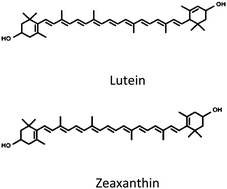 Metabolic syndrome is a complex condition characterized by central obesity, atherogenic dyslipidemia, vascular dysfunction and insulin resistance. Visceral fat and oxidative stress are major factors contributing to developing metabolic syndrome. It is thought that the carotenoids lutein and zeaxanthin also play a pivotal role in this condition due to their antioxidant activity and could offer protection against atherosclerosis and diabetes which are influenced by oxidative stress.
Metabolic syndrome is a complex condition characterized by central obesity, atherogenic dyslipidemia, vascular dysfunction and insulin resistance. Visceral fat and oxidative stress are major factors contributing to developing metabolic syndrome. It is thought that the carotenoids lutein and zeaxanthin also play a pivotal role in this condition due to their antioxidant activity and could offer protection against atherosclerosis and diabetes which are influenced by oxidative stress.
As eggs are a good source of highly bioavailable lutein and zeaxanthin (due to their incorporation in the lipid matrix of the yolk) scientists from Connecticut, US, have investigated the effects of eating 3 whole eggs daily for 12 weeks, as part of a weight loss regime. They found that, in combination with a carbohydrate restricted diet, eating eggs resulted in favorable effects on plasma carotenoid status in participants with metabolic syndrome. Furthermore, HDL and LDL were enriched with lutein and zeaxanthin, which may have significant health implications for preventing the development of metabolic syndrome-related conditions such as cardiovascular disease and type-2 diabetes.
To read the article in full for free until 3rd January 2013, please click the link below:
Egg intake improves carotenoid status by increasing plasma HDL cholesterol in adults with metabolic syndrome, Christopher N. Blesso, Catherine J. Andersen, Bradley W. Bolling and Maria Luz Fernandez, Food Funct., 2013, DOI: 10.1039/c2fo30154g
You may also be interested in this article which is free to access…
Effects of eggs on plasma lipoproteins in healthy populations, Maria Luz Fernandez, Food Funct., 2010, 1, 156-160
You can keep up to date with the latest developments from Food & Function by signing up for free table of contents alerts and monthly e-newsletters.










